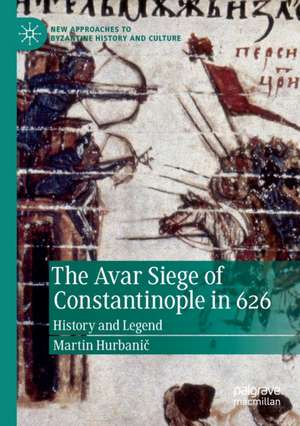The Avar Siege of Constantinople in 626: History and Legend: New Approaches to Byzantine History and Culture
Autor Martin Hurbaničen Limba Engleză Paperback – 16 aug 2020
| Toate formatele și edițiile | Preț | Express |
|---|---|---|
| Paperback (1) | 697.82 lei 43-57 zile | |
| Springer International Publishing – 16 aug 2020 | 697.82 lei 43-57 zile | |
| Hardback (1) | 708.75 lei 43-57 zile | |
| Springer International Publishing – 15 aug 2019 | 708.75 lei 43-57 zile |
Din seria New Approaches to Byzantine History and Culture
- 18%
 Preț: 722.43 lei
Preț: 722.43 lei - 15%
 Preț: 693.57 lei
Preț: 693.57 lei - 18%
 Preț: 791.57 lei
Preț: 791.57 lei - 15%
 Preț: 530.42 lei
Preț: 530.42 lei - 15%
 Preț: 705.34 lei
Preț: 705.34 lei - 15%
 Preț: 532.56 lei
Preț: 532.56 lei - 18%
 Preț: 891.96 lei
Preț: 891.96 lei - 9%
 Preț: 762.76 lei
Preț: 762.76 lei - 18%
 Preț: 722.89 lei
Preț: 722.89 lei - 18%
 Preț: 721.63 lei
Preț: 721.63 lei - 18%
 Preț: 724.63 lei
Preț: 724.63 lei - 18%
 Preț: 725.75 lei
Preț: 725.75 lei - 18%
 Preț: 721.01 lei
Preț: 721.01 lei - 18%
 Preț: 781.00 lei
Preț: 781.00 lei - 15%
 Preț: 691.91 lei
Preț: 691.91 lei - 18%
 Preț: 727.48 lei
Preț: 727.48 lei - 18%
 Preț: 732.70 lei
Preț: 732.70 lei - 15%
 Preț: 637.13 lei
Preț: 637.13 lei - 18%
 Preț: 735.84 lei
Preț: 735.84 lei - 18%
 Preț: 738.69 lei
Preț: 738.69 lei - 18%
 Preț: 953.65 lei
Preț: 953.65 lei - 18%
 Preț: 785.55 lei
Preț: 785.55 lei
Preț: 697.82 lei
Preț vechi: 820.96 lei
-15% Nou
Puncte Express: 1047
Preț estimativ în valută:
133.57€ • 145.14$ • 112.27£
133.57€ • 145.14$ • 112.27£
Carte tipărită la comandă
Livrare economică 21 aprilie-05 mai
Preluare comenzi: 021 569.72.76
Specificații
ISBN-13: 9783030166861
ISBN-10: 3030166864
Pagini: 361
Ilustrații: X, 361 p. 15 illus., 9 illus. in color.
Dimensiuni: 148 x 210 mm
Greutate: 0.45 kg
Ediția:1st ed. 2019
Editura: Springer International Publishing
Colecția Palgrave Macmillan
Seria New Approaches to Byzantine History and Culture
Locul publicării:Cham, Switzerland
ISBN-10: 3030166864
Pagini: 361
Ilustrații: X, 361 p. 15 illus., 9 illus. in color.
Dimensiuni: 148 x 210 mm
Greutate: 0.45 kg
Ediția:1st ed. 2019
Editura: Springer International Publishing
Colecția Palgrave Macmillan
Seria New Approaches to Byzantine History and Culture
Locul publicării:Cham, Switzerland
Cuprins
1. Introduction.- 2. The Memory of the Siege.- 3. The Interpretation of the Siege.- 4. The Last War of Antiquity.- 5. The Siege in Context.- 6. The Army of Besiegers.- 7. The Fortress Constantinople.- 8. The Avars at the Gates.- 9. The Final Solution.- 10. Winners and Losers.- 11. From History to Legend.- 12. The Akathistos.- 13. The Sacred Iconography of the Siege.- 14. The Spiritual Arsenal of the Siege.- 15. Conclusion.
Notă biografică
Martin Hurbanič is Associate Professor at Comenius University in Bratislava, Slovakia.
Textul de pe ultima copertă
This book examines the Avar siege of Constantinople in 626, one of the most significant events of the seventh century, and the impact and repercussions this had on the political, military, economic and religious structures of the Byzantine Empire. The siege put an end to the power politics and hegemony of the Avars in South East Europe and was the first attempt to destroy Constantinople, the capital of the Eastern Roman Empire. Besides the far-reaching military factors, the siege had deeper ideological effects on the mentality of the inhabitants of the Empire, and it helped establish Constantinople as the spiritual centre of eastern Christianity protected by God and his Mother. Martin Hurbanič discusses, from a chronological and thematic perspective, the process through which the historical siege was transformed into a timeless myth, and examines the various aspects which make the event a unique historical moment in the history of mankind – a moment in which the modern story overlaps with the legend with far-reaching effects, not only in the Byzantine Empire but also in other European countries.
Caracteristici
Presents a systematic and interdisciplinary account of the history and legend of the Avar attack on Constantinople Examines how the siege of Constantinople secured the city's status as the spiritual centre of the Byzantine Empire Analyses how the siege transformed from being an historical event to being a timeless myth
